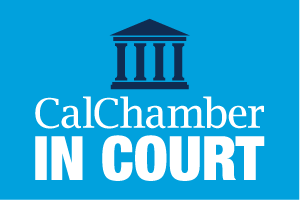 The California Chamber of Commerce is defending major provisions of workers’ compensation reform legislation and working to ensure fairness in friend-of-the-court briefs filed in three cases.
The California Chamber of Commerce is defending major provisions of workers’ compensation reform legislation and working to ensure fairness in friend-of-the-court briefs filed in three cases.
Lien Fee
- The fate of a $100 reimbursable “lien activation fee” is at the heart of Angelotti Chiropractic, Inc., et al. v. Christine Baker, et al.
The fee was imposed as part of the 2012 workers’ compensation reform package in hopes of addressing the needs of a system overburdened by lien claims while still meeting the constitutionally mandated goal of providing compensation to injured workers in an expeditious, inexpensive, and unencumbered manner. The lien activation fee is not a penalty; rather, it constitutes user funding payable to sustain and maintain the system in which lien claimants seek to participate.
Review of Medical Decisions
- The process for reviewing medical decisions is central to the case of José Dubon v. World Restoration, Inc., and State Compensation Insurance Fund (SCIF).
The CalChamber and the California Self-Insurers Association are asking the state Workers’ Compensation Appeals Board to reconsider its decision returning determinations of medical necessity back to the hands of nonmedical, nonexpert judges. The board’s decision is directly contrary to the legislative intent of the workers’ compensation reform law—that medical decisions are to be made by medical professionals—and results in a confusing, ill-defined two-track process for reviewing workers’ compensation medical decisions.
Ultimately, the CalChamber argues, the two-track approach will result in more litigation and increased costs, effectively removing any cost savings of either the Utilization Review or the Independent Medical Review processes.
Calculating Future Earnings
- The method of determining the future earning capacity of an injured worker is a key question in Contra Costa County v. Workers’ Compensation Appeals Board and Doreen Dahl.
The decision in the case conflicts directly with the 1st District Court of Appeal decision in Ogilvie v. Workers’ Comp. Appeals Bd (2011), which reaffirmed the basic principle that the employer is responsible only for compensation of disability directly caused by a work-related injury.
The CalChamber brief argues that the Dahl decision is in error because it relies upon a vocational analysis that fails to parcel out nonindustrial factors of earnings loss, and thus requires an employer to be liable for compensation of disability that was not directly caused by the industrial injury.
CalChamber Legal Affairs
The briefs were prepared by Ellen Sims Langille, a partner at the firm of Finnegan, Marks, Theofel & Desmond. The CalChamber Legal Affairs Department participates in major litigation that affects California employers.
The legal affairs unit files friend-of-the-court briefs on behalf of CalChamber members and key industries to emphasize the impact that judicial decisions would have on California’s economy.
More information is available at https://advocacy.calchamber.com/policy/legal-affairs/
Staff Contact: Heather Wallace


